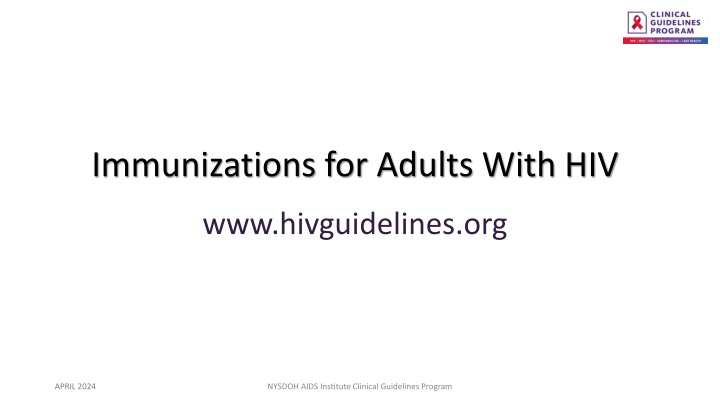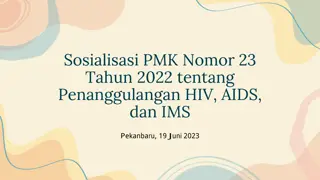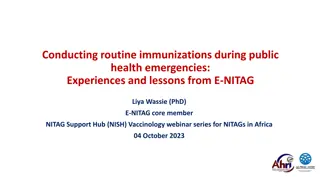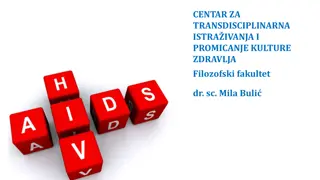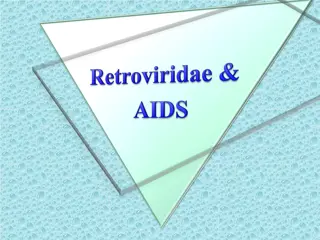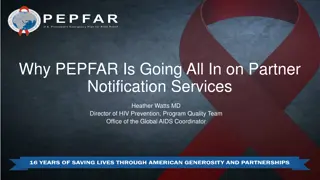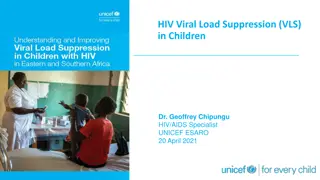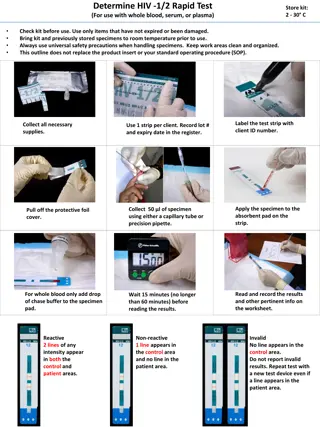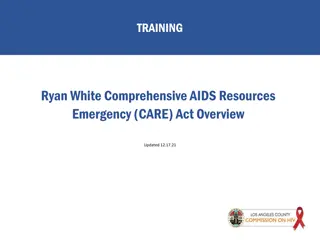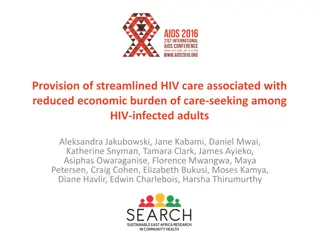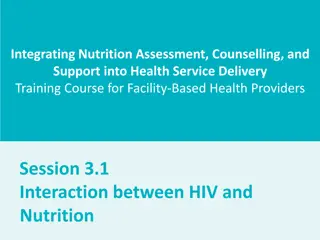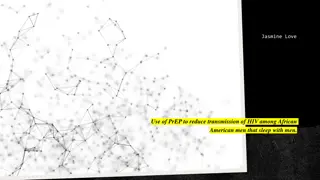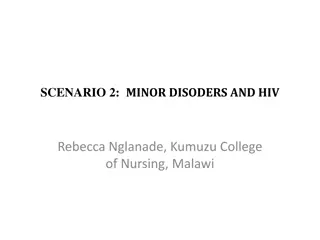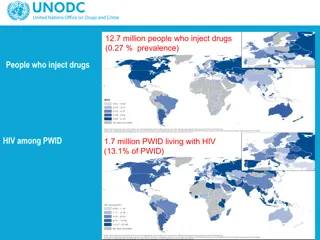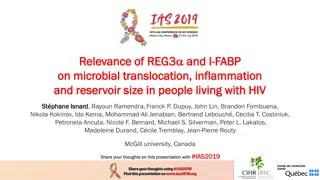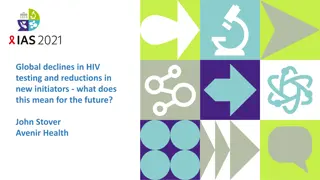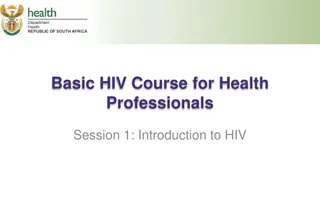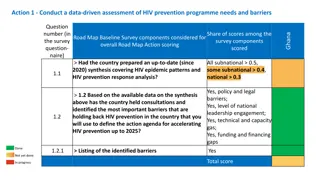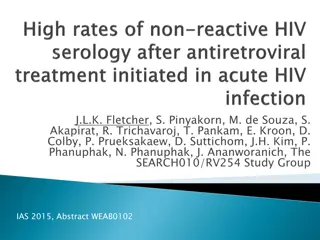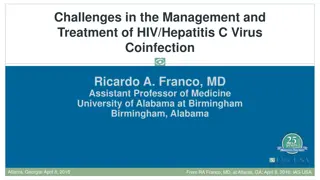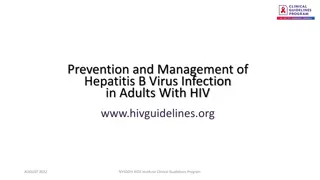Immunizations for Adults With HIV
This guideline provides recommendations for routine vaccinations for adults with HIV, including key points on the use of live attenuated vaccines. It also outlines COVID-19 vaccination information and schedules for individuals with varying levels of immunocompromise.
Download Presentation

Please find below an Image/Link to download the presentation.
The content on the website is provided AS IS for your information and personal use only. It may not be sold, licensed, or shared on other websites without obtaining consent from the author.If you encounter any issues during the download, it is possible that the publisher has removed the file from their server.
You are allowed to download the files provided on this website for personal or commercial use, subject to the condition that they are used lawfully. All files are the property of their respective owners.
The content on the website is provided AS IS for your information and personal use only. It may not be sold, licensed, or shared on other websites without obtaining consent from the author.
E N D
Presentation Transcript
Immunizations for Adults With HIV www.hivguidelines.org APRIL 2024 NYSDOH AIDS Institute Clinical Guidelines Program
Purpose of This Guideline Purpose of This Guideline Present a single compilation of all routine vaccinations for adults with HIV recommended by the Centers for Disease Control and Prevention (CDC), National Institutes of Health (NIH), HIV Medicine Association (HIVMA), and the Infectious Disease Society of America. APRIL 2024 NYSDOH AIDS Institute Clinical Guidelines Program www.hivguidelines.org
Recommendation: Immunizations Recommendation: Immunizations Clinicians should follow the recommendations for routine vaccination of adults with HIV issued by the Centers for Disease Control and Prevention, the National Institutes of Health, the HIV Medicine Association, and the Infectious Disease Society of America as presented here. (A3) APRIL 2024 NYSDOH AIDS Institute Clinical Guidelines Program www.hivguidelines.org
Key Points: Use of Live, Attenuated Vaccines Key Points: Use of Live, Attenuated Vaccines Individuals with CD4 count <200 cells/mm3: The following live, attenuated vaccines are contraindicated: Bacillus Calmette-Gu rin; measles, mumps, rubella; oral typhoid; rotavirus; varicella; yellow fever; zoster. Individuals with CD4 count 200 cells/mm3: Use live, attenuated vaccines only if an inactivated alternative is not available and the risk of disease is greater than the risk of vaccination. Patient education: Patients with HIV should avoid handling diapers of infants vaccinated against rotavirus in the previous 4 weeks, and all household members should wash their hands after changing diapers of an infant recently vaccinated against rotavirus. Those who lack varicella immunity should avoid direct contact with people who develop rash. APRIL 2024 NYSDOH AIDS Institute Clinical Guidelines Program www.hivguidelines.org
COVID COVID- -19 19 COVID-19 Vaccines Moderna COVID-19 Vaccine, Bivalent (mRNA vaccine) Pfizer-BioNTech COVID-19 Vaccine, Bivalent (mRNA vaccine) Novavax COVID-19 Vaccine, Adjuvanted (protein subunit vaccine) Janssen (Johnson & Johnson) COVID-19 Vaccine (adenovirus vector vaccine) Trade Names See FDA: COVID-19 Vaccines Authorized for Emergency Use or FDA-Approved Indications At least 1 bivalent mRNA COVID-19 vaccine for all individuals 6 months old Administration Administer according to CDC: COVID-19 Vaccination Schedule: Table 1: Recommended COVID-19 vaccination schedule for people who are not moderately or severely immunocompromised by COVID-19 vaccination history, May 2023 Table 2: Recommended COVID-19 vaccination schedule for people who are moderately or severely immunocompromised by COVID-19 vaccination history, May 2023 Comments See CDC: COVID-19 Vaccination Schedule for the following additional information: Description of moderate and severe immunocompromising conditions and treatments Considerations for individuals 65 years old to receive an additional bivalent mRNA dose Note: As of May 6, 2023, the J&J/Janssen viral vector COVID-19 vaccine is no longer available for use in the United States (see CDC: Overview of COVID-19 Vaccines). APRIL 2024 NYSDOH AIDS Institute Clinical Guidelines Program www.hivguidelines.org
Recommended COVID Recommended COVID- -19 Vaccination Schedule for Individuals 12 Years Old 19 Vaccination Schedule for Individuals 12 Years Old Who Are NOT Moderately or Severely Immunocompromised, May 2023 Who Are NOT Moderately or Severely Immunocompromised, May 2023 COVID-19 Vaccination History Recommendation Optional 1 dose of Moderna bivalent vaccine OR 1 dose of Pfizer- BioNTech bivalent vaccine Unvaccinated Individuals 65 years old have the option to receive 1 additional bivalent mRNA vaccine dose 4 months after first dose of a bivalent mRNA vaccine 1 dose of Moderna bivalent vaccine OR 1 dose of Pfizer- BioNTech bivalent vaccine Administer bivalent vaccine 8 weeks after last monovalent dose. 1 dose of monovalent mRNA vaccine; no previous doses of bivalent mRNA vaccine Vaccination is complete. Any previous dose(s) of bivalent mRNA vaccine, regardless of monovalent vaccine history 1 dose of Moderna bivalent vaccine OR 1 dose of Pfizer- BioNTech bivalent vaccine Administer bivalent vaccine 8 weeks after last monovalent dose. 1 dose of Novavax vaccine 1 dose of Moderna bivalent vaccine OR 1 dose of Pfizer- BioNTech bivalent Note: Administer bivalent vaccine 2 months after completion of the primary series dose (for people who have not previously received any booster doses) or 2 months after the last monovalent booster dose. 1 dose of J&J/Janssen vaccine (individuals 18 years old) APRIL 2024 NYSDOH AIDS Institute Clinical Guidelines Program www.hivguidelines.org
Recommended COVID Recommended COVID- -19 Vaccination Schedule for Individuals 12 Years Old 19 Vaccination Schedule for Individuals 12 Years Old Who ARE Moderately or Severely Immunocompromised, May 2023 Who ARE Moderately or Severely Immunocompromised, May 2023 COVID-19 Vaccination History Recommendation Interval Between Doses Moderna: 4 weeks between dose 1 and dose 2; 4 weeks between dose 2 and dose 3 Pfizer-BioNTech: 3 weeks between dose 1 and dose 2; 4 weeks between dose 2 and dose 3 Unvaccinated 3 doses of Moderna bivalent vaccine OR 3 doses of Pfizer-BioNTech bivalent vaccine Bivalent dose 1: 4 weeks after monovalent dose Bivalent dose 2: 4 weeks after bivalent dose 1 1 dose of monovalent Moderna vaccine 2 doses of Moderna bivalent vaccine 2 doses of monovalent Moderna vaccine 1 dose of Moderna bivalent vaccine 4 weeks after last monovalent dose 3 doses of monovalent Moderna vaccine 1 dose of Moderna bivalent vaccine OR 1 dose of Pfizer-BioNTech bivalent vaccine 8 weeks after last monovalent dose 3 doses of monovalent Moderna vaccine and 1 dose of bivalent mRNA vaccine 2 doses of Pfizer-BioNTech bivalent vaccine 2 months after last bivalent mRNA vaccine dose Bivalent dose 1: 3 weeks after monovalent dose Bivalent dose 2: 4 weeks after bivalent dose 1 1 dose of monovalent Pfizer-BioNTech vaccine 1 dose of Pfizer-BioNTech bivalent vaccine APRIL 2024 NYSDOH AIDS Institute Clinical Guidelines Program www.hivguidelines.org
Recommended COVID Recommended COVID- -19 Vaccination Schedule for Individuals 12 Years Old 19 Vaccination Schedule for Individuals 12 Years Old Who ARE Moderately or Severely Immunocompromised, May 2023, Who ARE Moderately or Severely Immunocompromised, May 2023, continued continued COVID-19 Vaccination History Recommendation Interval Between Doses 2 doses of monovalent Pfizer-BioNTech vaccine 1 dose of Pfizer-BioNTech bivalent vaccine 4 weeks after last monovalent dose 3 doses of monovalent Pfizer-BioNTech vaccine 1 dose of Moderna bivalent vaccine OR 1 dose of Pfizer-BioNTech bivalent vaccine 8 weeks after last monovalent dose 3 doses of monovalent Pfizer-BioNTech vaccine and 1 dose of bivalent mRNA vaccine Optional: 1 additional dose of Moderna bivalent vaccine OR Pfizer-BioNTech bivalent vaccine 2 months after last bivalent mRNA vaccine dose 1 or 2 doses of Novavax vaccine 1 dose of Moderna bivalent vaccine OR 1 dose of Pfizer-BioNTech bivalent vaccine 8 weeks after last monovalent dose Dose 1: 4 weeks after last monovalent dose Dose 2 (optional): 2 months after the recommended bivalent mRNA vaccine dose 1 dose of J&J/Janssen vaccine (individuals 18 years old) 1 or 2 doses of Moderna bivalent vaccine OR Pfizer-BioNTech bivalent vaccine 1 dose of J&J/Janssen vaccine (individuals 18 years old) and 1 dose of Moderna bivalent vaccine OR Pfizer-BioNTech bivalent vaccine Optional: 1 dose of Moderna bivalent vaccine OR Pfizer-BioNTech bivalent vaccine 2 months after the previous bivalent mRNA vaccine dose APRIL 2024 NYSDOH AIDS Institute Clinical Guidelines Program www.hivguidelines.org
Key Points: COVID Key Points: COVID- -19 19 Medical mistrust may prevent people in high vaccine priority groups from seeking or agreeing to vaccination; heightened awareness and open discussion of medical mistrust are essential to encouraging vaccination of people with HIV. The effects of systemic racism and associated health inequities made apparent by the U.S. COVID-19 pandemic may create barriers to vaccine access among some people with HIV. Clinicians who provide medical care for people with HIV are strongly encouraged to discuss and advocate for vaccination with all of their patients. APRIL 2024 NYSDOH AIDS Institute Clinical Guidelines Program www.hivguidelines.org
Haemophilus influenzae Haemophilus influenzae Type B (Hib) Type B (Hib) Haemophilus influenzae Type B Vaccine Hiberix ActHIB Trade Names Indications Patients at risk of Hib infection Administration Administer according to CDC: Adult Immunization Schedule: Recommendations for Ages 19 Years and Older, 2023 (Table 1) Recommendations by Medical Condition and Other Indication (Table 2) Revaccination None Comments Not routinely recommended for people with HIV in the absence of other risk factors APRIL 2024 NYSDOH AIDS Institute Clinical Guidelines Program www.hivguidelines.org
Hepatitis A Virus (HAV) Hepatitis A Virus (HAV) Hepatitis A Virus Vaccine HAV: Havrix; Vaqta HAV inactivated + HBV: Twinrix Trade Names Indications All adults with HIV Administration Administer according to CDC: Adult Immunization Schedule: Recommendations for Ages 19 Years and Older, 2023 (Table 1) Recommendations by Medical Condition and Other Indication (Table 2) Notes: Obtain HAV IgG testing 1 month after final dose of vaccination series to confirm immune response. If immune reconstitution appears likely, consider deferring until patient s CD4 count 200 cells/mm3 Revaccination Patients who do not respond to the primary HAV vaccination series should be revaccinated and counseled to avoid exposure. See NYSDOH AI guideline Prevention and Management of Hepatitis A Virus Infection in Adults With HIV. Covered by HRSA: Vaccine Injury Compensation Program Comments APRIL 2024 NYSDOH AIDS Institute Clinical Guidelines Program www.hivguidelines.org
Hepatitis B Virus (HBV) Hepatitis B Virus (HBV) Hepatitis B Virus Vaccine HBV 2-dose series: HEPLISAV-B (see comments) HBV 3-dose series: Engerix-B; Recombivax HB; PreHevbrio (see comments) HAV inactivated + HBV 3-dose series: Twinrix Trade Names Patients who are negative for anti-HBs and do not have chronic HBV infection Indications Administer according to CDC: Adult Immunization Schedule: Recommendations for Ages 19 Years and Older, 2023 (Table 1) Recommendations by Medical Condition and Other Indication (Table 2) Notes: Alternative administration strategies, such as a 3- or 4-injection double-dose vaccination series or an accelerated schedule of 0, 1, and 3 weeks, may be considered. Test for anti-HBs 4 to 16 weeks after administration of the last dose of the vaccination series. Administration Patients who do not respond to the primary HBV vaccination series (anti-HBs <10 IU/L) should be revaccinated with Heplisav-B or a double dose of the vaccine series previously administered. Revaccination In patients at risk for HBV infection, initial vaccination should not be deferred if the CD4 count is <200 cells/mm3. If an accelerated schedule is used, a fourth booster dose should be administered 6 months after initiation of the series; the accelerated schedule is not recommended for patients with CD4 counts <500 cells/mm3. The HAV/HBV combined vaccine is not recommended for the double-dose or 4-injection HBV vaccination strategy. PreHevbrio, a 3-antigen recombinant HBV vaccine, was approved in 2021 by the FDA for use for individuals 18 years old, but experience regarding its use in patients with HIV is lacking at this time. Heplisav-B and PreHevbrio are not recommended in pregnancy because of lack of safety data. See NYSDOH AI guideline Prevention and Management of Hepatitis B Virus Infection in Adults With HIV. Covered by HRSA: Vaccine Injury Compensation Program Comments APRIL 2024 NYSDOH AIDS Institute Clinical Guidelines Program www.hivguidelines.org
Human Papillomavirus (HPV) Human Papillomavirus (HPV) Human Papillomavirus Vaccine Gardasil 9 Trade Name All patients 9 to 45 years old who were not previously vaccinated or did not receive a complete 3-dose series Indications Administer through age 45 years as a 3-dose series according to CDC: Adult Immunization Schedule: Recommendations for Ages 19 Years and Older, 2023 (Table 1) Recommendations by Medical Condition and Other Indication (Table 2) Administration None Revaccination A 2-dose schedule is not recommended. Because of the broader coverage offered by the 9-valent HPV vaccine, it is the only HPV vaccine currently available in the United States. Although the 9-valent vaccine has not been specifically studied in people with HIV, it is expected that the response will be the same in this population as with the quadrivalent vaccine. Follow recommendations for cervical and anal cancer screening in NYSDOH AI guidelines Screening for Cervical Dysplasia and Cancer in Adults With HIV and Screening for Anal Dysplasia and Cancer in Adults With HIV. Covered by HRSA: Vaccine Injury Compensation Program Comments APRIL 2024 NYSDOH AIDS Institute Clinical Guidelines Program www.hivguidelines.org
Influenza Influenza Influenza Vaccine Trade Names See CDC influenza vaccines table Indications All adults with HIV Administration Administer annually during flu season (October through May) according to CDC: Adult Immunization Schedule: Recommendations for Ages 19 Years and Older, 2023 (Table 1) Recommendations by Medical Condition and Other Indication (Table 2) Revaccination None Comments Covered by HRSA: Vaccine Injury Compensation Program APRIL 2024 NYSDOH AIDS Institute Clinical Guidelines Program www.hivguidelines.org
Measles, Mumps, Rubella (MMR) Measles, Mumps, Rubella (MMR) Measles, Mumps, Rubella Vaccine Trade Names M-M-R II For patients with CD4 counts 200 cells/mm3for 6 months who do not have evidence of MMR immunity Indications Administration Administer according to CDC: Adult Immunization Schedule: Recommendations for Ages 19 Years and Older, 2023 (Table 1) Recommendations by Medical Condition and Other Indication (Table 2) Revaccination Recommended only in the setting of an outbreak Contraindicated for patients with CD4 counts <200 cells/mm3 The MMR + varicella vaccine (ProQuad) should not be substituted for the MMR vaccine. Those who previously received 2 doses of a mumps-containing vaccine and are at increased risk for mumps in the setting of an outbreak should receive a third dose to improve protection against mumps disease and related complications. Covered by HRSA: Vaccine Injury Compensation Program Comments APRIL 2024 NYSDOH AIDS Institute Clinical Guidelines Program www.hivguidelines.org
Meningococcal Serotypes A,C, W, and Y Meningococcal Serotypes A,C, W, and Y ( (MenACWY MenACWY) ) Meningococcal Serotypes A,C, W, and Y Vaccine Menactra (MenACWY-D) Menveo (MenACWY-CRM) MenQuadfi (MenACWY-TT) Trade Names All patients with HIV Indications Administer 2 doses of MenACWY vaccine 8 weeks apart in those not previously vaccinated. For those previously vaccinated with 1 dose of MenACWY vaccine, administer the second dose at the earliest opportunity 8 weeks after the previous dose. See CDC: Adult Immunization Schedule: Recommendations for Ages 19 Years and Older, 2023 (Table 1) Recommendations by Medical Condition and Other Indication (Table 2) Administration Administer 1 booster dose of MenACWY vaccine every 5 years. Revaccination MenACWY-D should not be administered until 4 weeks after pneumococcal conjugate vaccine. See Meningococcal Disease: NYSDOH Health Advisory and Vaccine Recommendations Covered by HRSA: Vaccine Injury Compensation Program Comments APRIL 2024 NYSDOH AIDS Institute Clinical Guidelines Program www.hivguidelines.org
Meningococcal Serotype B ( Meningococcal Serotype B (MenB MenB) ) MenB Vaccine for Prevention of MenB Infection Bexsero (4CMenB) Trumenba (MenB-FHbp) Trade Names Indications Patients at risk of MenB infection Administration Administer according to CDC: Adult Immunization Schedule 2023 Revaccination None Bexsero (4CMenB) and Trumenba (MenB-FHbp) are not interchangeable. Not routinely recommended for people with HIV in the absence of other risk factors Covered by HRSA: Vaccine Injury Compensation Program Comments APRIL 2024 NYSDOH AIDS Institute Clinical Guidelines Program www.hivguidelines.org
Recommendations: Recommendations: Mpox Mpox Vaccine Vaccine Clinicians should recommend vaccination against mpox (formerly monkeypox ) for individuals 18 years old with HIV who are at high risk of or who have been exposed to mpox within the past 14 days and for whom vaccination may reduce the risk of infection or decrease symptoms if infection has occurred. (A2) Clinicians should use only the JYNNEOS (Imvamune or Imvanex) mpox vaccine for individuals with HIV, as it is the only available vaccine that is considered safe for administration in this population. (A*) Clinicians should recommend vaccination for adults with HIV, regardless of their CD4 cell count and degree of viral suppression. (A3) APRIL 2024 NYSDOH AIDS Institute Clinical Guidelines Program www.hivguidelines.org
Mpox Mpox Mpox Vaccine Trade Name JYNNEOS (also called Imvamune or Imvanex) Type of Vaccine Live virus that does not replicate efficiently in human cells Administration Two subcutaneous injections 4 weeks apart Indication Individuals with HIV 18 years old who are at high risk of or who have been exposed to mpox within the past 14 days Adverse Reactions Injection site reactions such as pain, swelling, and redness. Vaccination with JYNNEOS will not cause mpox infection. Contraindications Severe allergy to any component of the vaccine (gentamicin, ciprofloxacin, or egg protein) Immune Response Maximal development of the immune response takes 2 weeks after second dose. Pregnancy/ Breastfeeding No evidence of reproductive harm from animal data. Pregnancy and breastfeeding are not contraindications for vaccination. APRIL 2024 NYSDOH AIDS Institute Clinical Guidelines Program www.hivguidelines.org
Key Points: Key Points: Mpox Mpox JYNNEOS (Imvamune or Imvanex) is the only mpox vaccination safe for adults with HIV. Care should be taken to avoid language and behavior that marginalizes and stigmatizes communities at risk. APRIL 2024 NYSDOH AIDS Institute Clinical Guidelines Program www.hivguidelines.org
Pneumococcal Pneumococcal Pneumococcal Vaccine Vaxneuvance (PCV15; 15-valent pneumococcal conjugate vaccine) Prevnar 20 (PCV20; 20-valent pneumococcal conjugate vaccine) Pneumovax 23 (PPSV23; 23-valent pneumococcal polysaccharide vaccine) Trade Names Indications All patients with HIV Administration For patients who have not received a pneumococcal vaccine or whose vaccination status is unknown: Vaccinate with 1 dose of PCV15 or 1 dose of PCV20. If PCV15 is used, follow with 1 dose of PPSV23, with a minimum interval of 8 weeks between the doses. Revaccination Consult CDC: PneumoRecs VaxAdvisor Pneumococcal vaccination should be not be deferred for patients with CD4 count <200 cells/mm3 and/or detectable viral load; however, the follow-up secondary administration of the PPSV23 vaccine may be deferred until the patient s CD4 count is 200 cells/mm3 and/or viral load is undetectable. The Menactra (MenACWY-D) vaccine for meningococcal serotype groups A,C, W, and Y (MenACWY) should not be administered until 4 weeks after pneumococcal conjugate vaccine. Comments APRIL 2024 NYSDOH AIDS Institute Clinical Guidelines Program www.hivguidelines.org
Tetanus, Diphtheria, and Pertussis (Tdap) and Tetanus, Diphtheria, and Pertussis (Tdap) and Tetanus Tetanus- -Diphtheria (Td) Diphtheria (Td) Tetanus, Diphtheria, and Pertussis and Tetanus-Diphtheria Vaccines Tdap: Adacel; Boostrix Td: Tenivac; TDVax Trade Names Indications All adult patients Administration Administer according to CDC: Adult Immunization Schedule: Recommendations for Ages 19 Years and Older, 2023 (Table 1) Recommendations by Medical Condition and Other Indication (Table 2) Revaccination Td is usually given as a booster dose every 10 years, but it can also be given earlier after a severe and dirty wound or burn. Comments Covered by HRSA: Vaccine Injury Compensation Program APRIL 2024 NYSDOH AIDS Institute Clinical Guidelines Program www.hivguidelines.org
Varicella Varicella Varicella Vaccine Varivax Trade Names For patients with CD4 counts 200 cells/mm3 who do not have evidence of immunity to varicella Indications Administer according to CDC: Adult Immunization Schedule: Recommendations for Ages 19 Years and Older, 2023 (Table 1) Recommendations by Medical Condition and Other Indication (Table 2) Administration None Revaccination Contraindicated for patients with CD4 counts <200 cells/mm3 Anti-varicella IgG screening should be performed in patients with no known history of chickenpox or shingles. MMR + varicella (ProQuad) vaccine should not be used. Antiherpetic agents should be avoided 24 hours before and for 14 days after administration. An interval of 5 months is recommended between administration of post-exposure VariZIG and varicella vaccination. Clinical disease due to varicella after vaccination, a very rare event, should be treated with acyclovir. Covered by HRSA: Vaccine Injury Compensation Program Comments APRIL 2024 NYSDOH AIDS Institute Clinical Guidelines Program www.hivguidelines.org
Zoster Zoster Zoster Vaccine Trade Names Shingrix: RZV, adjuvanted Indications MCCC recommendation: Patients with HIV 18 years old (A2) Two intramuscular doses, given 2 to 6 months apart, regardless of past receipt of ZVL (brand name Zostavax) Perform anti-varicella IgG screening in patients with no known history of chickenpox or shingles. See CDC: Adult Immunization Schedule: Recommendations for Ages 19 Years and Older, 2023 (Table 1) Recommendations by Medical Condition and Other Indication (Table 2) RZV provides strong protection against shingles and post-herpetic neuralgia. Currently, there are no data on immunogenicity specific to people with HIV; however, superior efficacy and longer duration of protection have been demonstrated among the elderly, and a recombinant vaccine is preferred for people with HIV. As of November 2020, ZVL is no longer available for use in the United States. Administration Comments APRIL 2024 NYSDOH AIDS Institute Clinical Guidelines Program www.hivguidelines.org
Need Help? Need Help? NYSDOH AIDS Institute Clinical Guidelines Program www.hivguidelines.org
Access the Guideline Access the Guideline www.hivguidelines.org > Immunizations for Adults With HIV Also available: Printable PDF NYSDOH AIDS Institute Clinical Guidelines Program www.hivguidelines.org
